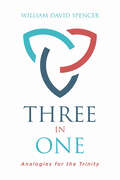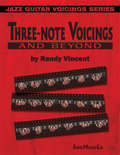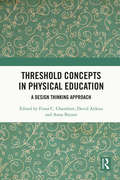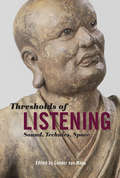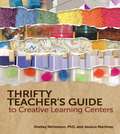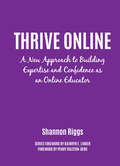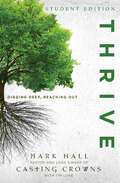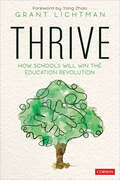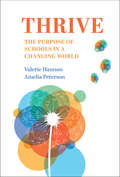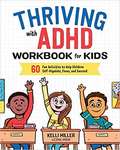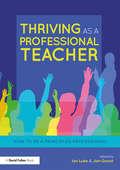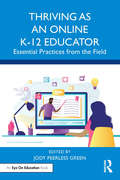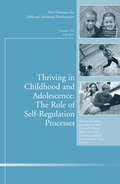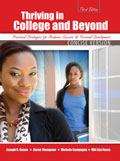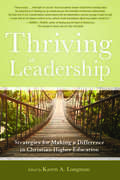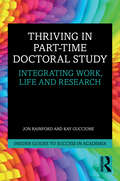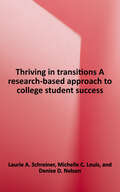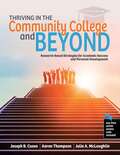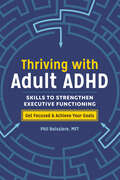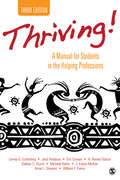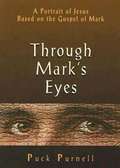- Table View
- List View
Three in One: Analogies for the Trinity
by William David SpencerDo our images of "one God in three persons" reflect God well?Throughout history, Christians have pictured the relationships between Father, Son, and Holy Spirit through analogies. Such illustrations--some from the West but also from Latin America, Asia, Africa, and other places--come laden with theological ramifications that the church has rejected (heresies) or embraced (doctrines). In Three in One, William David Spencer shares a lifetime of insights from teaching within the global church, bringing fresh images and analogies of the Trinity to deepen our theological vocabulary.Drawing from his extensive teaching in geographically and culturally diverse contexts and his artist's passion for evocative words and visuals, Spencer offers readers a rich, multifaceted, and practical exploration of the Trinity. Alongside historical and contemporary theology and biblical studies, he considers the strengths and shortcomings of various analogies used to explain the Trinity, such as:LightWaterThe Celtic knotThe totem poleMusical harmoniesThe human bodyThe familyReaders of Three in One will gain a personal understanding of the Trinity as well as tools for teaching about the Trinity in adult and children's ministry contexts.
Three-Note Voicings and Beyond
by Randy VincentRandy Vincent's second Sher Music Co. book covers every aspect of the crucial three-note voicings every guitarist needs to know. It has received glowing endorsements from Pat Metheny, Jim Hall, Mike Stern, Ben Monder, Vic Juris, Gene Bertoncinni, Julian Lage, etc. Three-Note Voicings and Beyond is for everyone from intermediate newcomers to jazz guitar to very advanced players. The book develops a unique dynamic concept of harmony where three independently moving lines team up to create beautiful harmonies that are valuable for comping, chord melodies and chordal jazz improvisations. Topics include: Three-note shell voicings and special derived comp voicings Compete triad review including all close and open inversions on all strings A section on developing walking guitar voicings, harmonized bass lines perfect for accompaniments in situations where no bass or keyboard is present Sections on triad applications such as slash chords, upper structures, hexatonic triad-pairs and special hybrid voicings Quartal and secundal voicings perfect for modal comping and soloing Drop-2 reductions perfect for melody harmonizations A complete method to develop a realistic simulation of Shearing-style block-chord voicings on guitar. Plus much more!
Threshold Concepts in Physical Education: A Design Thinking Approach
by Fiona C. Chambers David Aldous Anna BryantThis innovative and user-friendly book uses a design thinking approach to examine transformative learning and liminality in physical education. Covering theory and practice, it introduces the important idea of ‘threshold concepts’ for physical education, helping physical educators to introduce those concepts into curriculum, pedagogy and assessment. The book invites us to reflect on what is learned in, through and about physical education - to identify its core threshold concepts. Once identified, the book explains how the learning of threshold concepts can be planned using principles of pedagogical translation for all four learning domains (cognitive, psychomotor, affective and social). The book is arranged into three key sections which walk the reader through the underpinning concepts, use movement case studies to explore and generate threshold concepts in physical education using design thinking approach and, finally, provide a guiding Praxis Matrix for PE Threshold Concepts that can be used for physical educators across a range of school and physical activity learning contexts. Outlining fundamental theory and useful, practical teaching and coaching advice, this book is invaluable reading for all PE teacher educators, coach educators, and any advanced student, coach or teacher looking to enrich their knowledge and professional practice.
Thresholds of Listening: Sound, Technics, Space
by Sander Van MaasThresholds of Listening addresses recent and historical changes in the ways listening has been conceived. Listening, having been emancipated from the passive, subjected position of reception, has come to be asserted as an active force in culture and in collective and individual politics.The contributors to this volume show that the exteriorization of listening— brought into relief by recent historical studies of technologies of listening—involves a re-negotiation of the theoretical and pragmatic distinctions that underpin the notion of listening. Focusing on the manifold borderlines between listening and its erstwhile others, such as speaking, reading, touching, seeing, or hearing, the book maps new frontiers in the history of aurality. They suggest that listening’s finitude— defined in some of the essays as its death or deadliness—should be considered as a heuristic instrument rather than as a mere descriptor.Listening emerges where it appears to end or to run up against thresholds and limits—or when it takes unexpected turns. Listening’s recent emergence on the cultural and theoretical scene may therefore be productively read against contemporary recurrences of the motifs of elusiveness, finitude, and resistance to open up new politics, discourses, and technologies of aurality.
Thrifty Teacher's Guide to Creative Learning Centers
by Jessica Martinez Shelley NicholsonIt's a common dilemma in early childhood classrooms: How to provide new, interesting experiences on a shoestring budget. Pulling from their decades of experience in classrooms, authors Shelley Nicholson, PhD, and Jessica Martinez offer low-cost ideas for gathering and creating rich explorations in learning centeres. Thrifty Teacher's Guide to Creative Learning Centers vividly describes the unique ways teachers can use found and recyclable materials to encourage cognitive development and creative exploration in young children. In addition to photographic examples, the book offers tips on how to source, select, and integrate materials into a center; how to get children started on using the materials; and how to scaffold learning with open-ended questions. These ideas are just the beginning. Once children's imaginations take off, they can use the materials in myriad ways.
Thrive Online: A New Approach to Building Expertise and Confidence as an Online Educator (The\thrive Online Seriesis Focused On The Needs, Interests, And The Best Practices Of Online Educators With The Ultimate Goal Of Helping Them To Better Serve Online Students. The Contributors To The Thrive Online Seriesare Fearless, Committed Thought Leaders Who Have Embraced The Online Education Landscape And Believe In Not Just The Future Of Online Instruction, But Also The Now And How Of Online)
by Shannon RiggsResearch shows that online education, when designed and facilitated well, is as effective as traditional campus-based instruction. Despite the evidence, many faculty perceive online education as inferior to traditional instruction—and are often quite vocal in their skepticism. Simultaneously, however, more and more students are seeking online courses and degree programs.Thrive Online: A New Approach to Building Expertise and Confidence as an Online Educator is an invitation for the rising tide of online educators who are relatively new to teaching online, and also for those more experienced instructors who are increasingly frustrated by the dominant bias against online education.Readers will find:• An approach that empowers online educators to thrive professionally using a set of specific agentic behaviors• Strategies for approaching conversations about online learning in new ways that inform the skeptics and critics• Strategies that celebrate the additional skills and proficiencies developed by successful online educators• Guidance for educators who want to feel natural and fluent in the online learning environment• Guidance for enhancing the user-centered nature of online spaces to create student-centered learning environments• Encouragement for online educators to pursue leadership opportunitiesThe internet is changing how people communicate and learn. Thrive Online: A New Approach to Building Expertise and Confidence as an Online Educator offers guidance, inspiration and strategies required to adapt and lead higher education through this change. This book is for higher education instructors who are seeking community, a sense of belonging, and the professional respect they deserve. Thriving is not a reaction to our environment, but rather a state of being we can create intentionally for ourselves.The time has come to change the conversation about online education. Add your voice – join the community and #ThriveOnline.
Thrive Student Edition: Digging Deep, Reaching Out
by Tim Luke Mark HallYou've probably heard the words "Live out your faith" dozens, if not hundreds, of times, but what does that phrase really mean? And how do you really follow Jesus in today's world? In this student adaptation of his book Thrive, Casting Crowns' Mark Hall explores exactly what it means when your faith and your life collide, and how you can take the next steps in making that faith real and evident to those around you. Using relatable stories, applications you can use, as well as some life lessons, Hall shows how you can root yourself in the truth and grow strong in your beliefs as you become the person God designed you to be.
Thrive: How Schools Will Win the Education Revolution
by Grant LichtmanBecome an irresistible school Our rapidly evolving world is dramatically impacting how we view schools. Fortunately, we have the knowledge to not only survive, but thrive during rapid change. Other organizations have faced these evolutionary disruptions for centuries. Thrive: How Schools Will Win the Education Revolution translates this knowledge for educators. Written by Grant Lichtman, a thought leader on the transformation of education, this book will help administrators understand: • The most important concepts in creating long-term success: value, strategy, and innovation • The Five Big Tools of strategic change, to build both a comfort and capacity for change • The reality of competing in an evolving marketplace Families are choosing from a growing menu of learning options. Your school needs a value proposition that shouts, "We are your best choice!" As an educator, you have an important role to play in winning the education revolution and making your school irresistible to your community.
Thrive: How Schools Will Win the Education Revolution
by Grant LichtmanBecome an irresistible school Our rapidly evolving world is dramatically impacting how we view schools. Fortunately, we have the knowledge to not only survive, but thrive during rapid change. Other organizations have faced these evolutionary disruptions for centuries. Thrive: How Schools Will Win the Education Revolution translates this knowledge for educators. Written by Grant Lichtman, a thought leader on the transformation of education, this book will help administrators understand: • The most important concepts in creating long-term success: value, strategy, and innovation • The Five Big Tools of strategic change, to build both a comfort and capacity for change • The reality of competing in an evolving marketplace Families are choosing from a growing menu of learning options. Your school needs a value proposition that shouts, "We are your best choice!" As an educator, you have an important role to play in winning the education revolution and making your school irresistible to your community.
Thrive: The Purpose of Schools in a Changing World
by Valerie Hannon Amelia PetersonEvery generation faces challenges, but never before have young people been so aware of theirs. Whether due to school strikes for climate change, civil war, or pandemic lockdowns, almost every child in the world has experienced the interruption of their schooling by outside forces. When the world we have taken for granted proves so unstable, it gives rise to the question: what is schooling for? Thrive advocates a new purpose for education, in a rapidly changing world, and analyses the reasons why change is urgently needed in our education systems. The book identifies four levels of thriving: global – our place in the planet; societal – localities, communities, economies; interpersonal – our relationships; intrapersonal – the self. Chapters provide research-based theoretical evidence for each area, followed by practical international case studies showing how individual schools are addressing these considerable challenges. Humanity's challenges are shifting fast: schools need to be a part of the response.
Thriving In College And Beyond: Research-based Strategies For Academic Success And Personal Development
by Joe B. Cuseo Viki S. Fecas Aaron Thompson Michele CampagnaThriving in the Community College and Beyond: Strategies for Academic Success and Personal Development With Lassi Code
Thriving With ADHD Workbook For Kids: 60 Fun Activities To Help Children Self-regulate, Focus, And Succeed
by Kelli MillerWith the right tools, kids can learn to think positively about their ADHD and see it as a special asset. Thriving with ADHD is filled with easy exercises to help your child with the many facets of ADHD, from self-control and organization to getting tasks done and making friends―so they can flourish at home, school, and beyond. <P><P> Kids will learn to reframe the way they think about ADHD as they discover their own unique talents. With fun activities that engage their busy minds, this workbook offers a strength-based approach to help your child gain a better understanding of themselves, their ADHD, and the simple things they can do to feel more confident and in control. <P><P> This ADHD workbook for kids includes: An overview of ADHD―Teach your child about common symptoms, different ADHD types, and how ADHD can be an advantage. Skill-building exercises―Establish key executive functioning skills, like dealing with anger and frustration, staying focused, controlling impulses, and communicating effectively. Action-oriented learning―Help kids thrive in their daily lives with fun lessons for creating a morning routine, making a homework chart, expressing themselves when they’re upset, and more. Show your child how to harness their unique gifts and live life to the fullest with their ADHD―this practical workbook will help guide the way.
Thriving as a Professional Teacher: How to be a Principled Professional
by Ian Luke Jan GourdThriving as a Professional Teacher explores the tensions and balance between developing the classroom you know will be best for the children you teach, and facing external pressures such as Ofsted, performance management, Teacher Standards and the need to prepare children for SATs and other tests. The book locates the professional in the political context before outlining the key challenges faced and experienced, and laying the foundations necessary for the professional to thrive. An expert team of contributors analyses the differences between professionalism and 'professionalisation', and emphasises the importance of promoting a collaborative, sharing culture to give you the knowledge needed to challenge and contest competing agendas. Topics covered include: understanding the impact of policy upon teachers and the teaching profession; developing a professional identity as a teacher; building resilience and a sense of wellbeing as a teacher; building and sustaining creativity in the curriculum; safeguarding young people; examining the impact of globalisation on educational practices. With case studies, opportunities for reflection and clear chapter summaries woven throughout, Thriving as a Professional Teacher will help you to form a sustainable identity and to create a teaching and learning environment in which both teachers and students can thrive. It is an essential read for both trainee and practising teachers.
Thriving as an Online K-12 Educator: Essential Practices from the Field
by Jody Peerless GreenThriving as an Online K-12 Educator is the perfect all-in-one guide to taking your K-12 class online. We know, now more than ever, that teachers have not been equally or systematically trained and resourced to make a sudden transition to online or blended instruction. This concise, accessible book collects time-tested strategies and fresh perspectives from experienced educators to help you smooth out even the most abrupt shift to technology-enhanced teaching and learning. With these insights into institutional supports, effective digital tools, equitable practice, social-emotional considerations, and beyond, you will be better prepared than ever to help your students thrive in online and blended learning environments.
Thriving in Childhood and Adolescence: New Directions for Child and Adolescent Development, Number 133 (J-B CAD Single Issue Child & Adolescent Development #109)
by Richard M. Lerner Jacqueline V. Lerner Edmond P. Bowers Selva Lewin-Bizan Steinunn Gestsdottir Jennifer Brown UrbanOpening with a discussion on the need to integrate self-regulation processes and to create a life-span oriented framework of these processes, this volume explores several perspectives in the current scholarship. Chapter contributors examine theoretical concepts including Vygotsky/Luria Insights in the Development of Executive Functions Self-Regulation and Academic Achievement in Elementary School Children Influences of Children?s and Adolescents? Action-Control Processes on School Achievement, Peer Relationships, and Coping with Challenging Life Events Intentional Self-Regulation, Ecological Assets, and Thriving in Adolescence: A Developmental Systems Model and a Life-Span, Relational, Public Health Model of Self- Regulation: Impact on Individual and Community Health The volume concludes with New Directions for Child and Adolescent Development series editor-in-chief Reed W. Larson discussing the challenges reported by youth working on arts, technology, and social justice projects in organized programs and how they learn to address them. This is the 133nd volume of the Jossey-Bass quarterly report series New Directions for Child and Adolescent Development. The mission of this series is to provide scientific and scholarly presentations on cutting edge issues and concepts in the field of child and adolescent development. Each volume focuses on a specific new direction or research topic, and is edited by an expert or experts on that topic.
Thriving in College and Beyond: Concise Version (3rd Edition)
by Joe B. Cuseo Viki S. Fecas Aaron Thompson Michele CampagnaThriving in College and Beyond: Research-Based Strategies for Academic Success and Personal Development delivers content through modalities that are both visual and emotional. Snapshot summary boxes, concept maps, humorous illustrations, authors’ experiences, content-relevant quotes from successful people in multiple fields, and first-hand perspectives of current college students appear throughout. <p><p> Distinctive Features Include: <p> It’s comprehensive – it covers the full range of topics and issues that affect student success. This text treats the student as a whole person, addressing academic and personal development and encompasses the whole college experience, including success strategies that can be used in the first year of college and beyond. It’s written by a diverse team of authors who work in both the 2-year and 4-year college sectors. <p> It’s substantive – it contains content that the readers can “sink their teeth into.” It educates students not only about what they should do to be successful, but also why they should do it. This edition contains updated research and scholarly references supporting the concepts and strategies presented. <p> Readers become actively involved in the reading process by responding to reflection questions at three key points in time: before reading – questions at the start of each chapter that activate the reader’s thinking and prior knowledge about the chapter topic; while reading – periodic questions that encourage the reader to pause and reflect on what was just read; and after reading – end-of-chapter exercises that promote consolidation and application of knowledge acquired from the chapter.
Thriving in Leadership: Strategies for Making a Difference in Christian Higher Education
by Karen A. LongmanIn this book, seventeen senior leaders from faith-based colleges and universities across North America—collectively bringing with them hundreds of years of leadership experience—share fresh insights into the theory and practice of Christian higher education leadership. These authors speak honestly about the successes, failures, and demands that have shaped their current leadership decisions and their visions for the future.
Thriving in Part-Time Doctoral Study: Integrating Work, Life and Research (Insider Guides to Success in Academia)
by Kay Guccione Jon RainfordThriving in Part-Time Doctoral Study is a practical guide, designed to support part-time doctoral researchers in navigating their learning experience and providing them with the tools they need to succeed in academia, alongside the work and life challenges they may be facing. Featuring eight highly practical chapters, this book covers every aspect of the part-time doctoral journey from initial planning right through to completion.Easy to dip in and out of with realistic advice, learning points and reflective activities based on real experiences, this book: ● Reflects a diversity of voices across academic disciplines● Features real-world examples from doctoral researchers ● Can be referred to throughout the doctoral journey This key resource will support the reader in considering how best to access and draw on the communities of support available, get the most from a supervisory team, and build professional networks. It recognises that each student’s learning pathway is different and offers support to allow each individual to take control and make it their part-time doctorate. The ‘Insider Guides to Success in Academia’ offers support and practical advice to doctoral students and early-career researchers. Covering the topics that really matter, but which often get overlooked, this indispensable series provides practical and realistic guidance to address many of the needs and challenges of trying to operate, and remain, in academia. These neat pocket guides fill specific and significant gaps in current literature. Each book offers insider perspectives on the often implicit rules of the game – the things you need to know but usually aren’t told by institutional postgraduate support, researcher development units, or supervisors – and will address a practical topic that is key to career progression. They are essential reading for doctoral students, early-career researchers, supervisors, mentors, or anyone looking to launch or maintain their career in academia.
Thriving in Transitions: A Research-based Approach to College Student Success
by Laurie A. Schreiner Michelle C. Louis Denise D. NelsonThis book represents a paradigm shift in the student success literature. Grounded in positive psychology, the thriving concept reframes the student success conversation by focusing on the characteristics amenable to change and that promote high levels of academic, interpersonal, and intrapersonal performance in the college environment. The authors contend that a focus on remediating student characteristics or merely encouraging specific behaviors is inadequate to promote success in college and beyond. The collection presents six research studies describing the characteristics that predict thriving in different groups of college students, including first-year students, transfer students, high-risk students, students of color, sophomores, and seniors, and offers recommendations for helping students thrive in college and life.
Thriving in the Community College and Beyond: Research-Based Strategies for Academic Success and Personal Development
by Julie Mclaughlin Aaron Thompson Joseph B. CuseoThriving in the Community College & Beyond covers the full range of topics and issues that impact student success. Content is delivered through multiple formats and learning modalities, including snapshot summary boxes, concept maps, content-relevant cartoons, inspiring quotes from successful students and famous people, and poignant personal stories from the authors.
Thriving with Adult ADHD: Skills to Strengthen Executive Functioning
by Phil Boissiere MFTProven strategies for strengthening executive functioning skills and overcoming adult ADHD symptomsExecutive functioning skills—including focus, organization, stress management, and more—are critical to succeeding in all aspects of your life. Whether you've just been diagnosed with ADHD or you've lived with it your entire life, you know that developing these skills can be a challenge. Thriving with Adult ADHD offers information, assessments, and evidence-based exercises to help you build a mental skill set and take control of your ADHD.Make real, sustainable changes with practical guidance and activities for sharpening your memory and attention, learning to plan and organize, strengthening your mental flexibility, enhancing your emotional regulation, improving your impulse control, and living your best life.This ADHD book for adults includes:Executive functioning overview—Learn what executive functioning is, how it relates to ADHD, and how these exercises can help you develop it.Solutions for all settings—Discover actionable advice for managing ADHD symptoms at home, at work, and in relationships.Self-assessments—Identify your personal strengths and weaknesses with quick self-evaluations.Don't let ADHD symptoms hold you back. Gain the skills you need to achieve your goals with help from Thriving with Adult ADHD.
Thriving!: A Manual for Students in the Helping Professions
by Lennis G. Echterling Jack Presbury Eric W. Cowan A. Renee Staton Debbie C. Sturm Michele L. Kielty J. Edson McKee Anne L. Stewart William F. EvansWritten in a conversational and engaging style, this updated and expanded Third Edition of Thriving! helps future counselors and therapists to succeed in their training and professional development throughout their graduate careers. This informative and inspirational book includes an overview of the literature, personal accounts from students, practical tips/activities, and the latest coverage of such topics as advances in neuroscience research, crisis intervention, and more!
Thriving!: A Manual for Students in the Helping Professions
by Lennis G. Echterling Jack Presbury Eric W. Cowan A. Renee Staton Debbie C. Sturm Michele L. Kielty J. Edson McKee Anne L. Stewart William F. EvansWritten in a conversational and engaging style, this updated and expanded Third Edition of Thriving! helps future counselors and therapists to succeed in their training and professional development throughout their graduate careers. This informative and inspirational book includes an overview of the literature, personal accounts from students, practical tips/activities, and the latest coverage of such topics as advances in neuroscience research, crisis intervention, and more!
Through Japan With Brush & Ink
by Chiura ObataThis Japanese ink painting guide is presented by master painter, Chiura Obata, a well-known Japanese artist.Obata has traveled throughout Japan, recording with charm and insight the beauty of the country. <P><P> Using the traditional brush-and-ink technique, he skillfully presents the varied aspects of Japan: a mountain landscape enveloped in mist, an intimate Japanese garden, the hustle of the busy city of Tokyo, the fleeting cherry blossoms, an ancient temple compound, a festive group of holiday sightseers. The artist captures with his deft sketches the special quality of Japan that attracts the visitor and resident alike.This is far more than a picture of Japan; it is rather a perceptive interpretation by one who knows and loves the country.
Through Mark's Eyes: A Portrait of Jesus Based on the Gospel of Mark
by Puck PurnellIncludes Study Guide Through Mark’s Eyes invites you into the Jesus story—to walk the dusty roads, to row the boats on the Sea of Galilee, to witness healings, to stand in the Temple, and to weep at the cross. This dramatic, colorful, moving version of the Gospel of Mark is not a new translation; instead, Puck Purnell augments the New Revised Standard Version of Mark with vivid language and descriptions to reimagine the Gospel story and breathe fresh life into it. “I was spellbound by Through Mark’s Eyes. I doubt I have ever read a gospel account from start to finish without interruption or desire for one.” -Barbara Howe, Harford, CT “I very much enjoyed reading Through Mark’s Eyes. I loved that the story was easy to follow. As for my plain, honest opinion, I can see people of my age reading, enjoying, and understanding this book.” -Allison Swayne, 8th grade, Henry James Middle School, Simsbury, CT “You have managed to convey the roughness and immediacy of Mark in a more contemporary narrative mode….Your work will offer people some new points of entry into the story and will stimulate reflection and discussion.” -L. William Countryman, Sherman E. Johnson Professor in Biblical Studies, Church Divinity School of the Pacific Puck Purnell, an Episcopal priest, serves as Rector at Old St. Andrew’s Church in Bloomfield, CT. A graduate of Berkeley Divinity School at Yale, he is a talented preacher and teacher. Mr. Purnell lives with his wife, Joanne Kimball, in Simsbury, CT.
